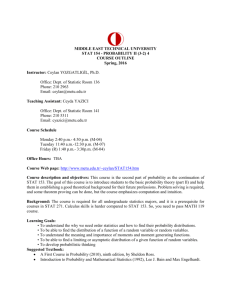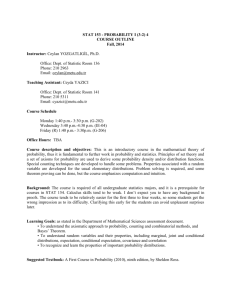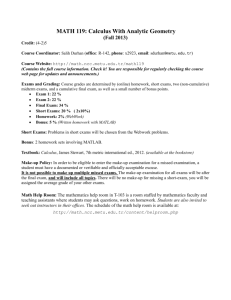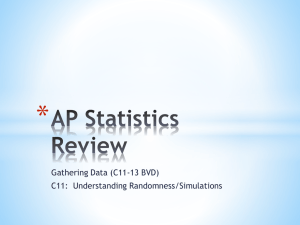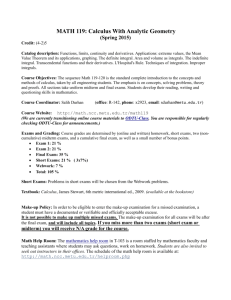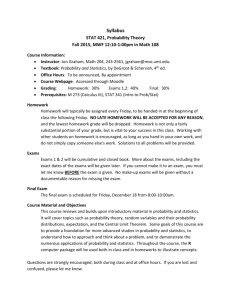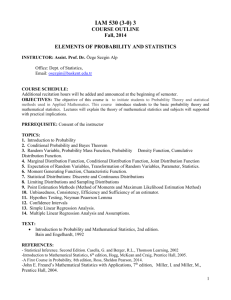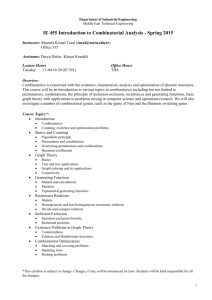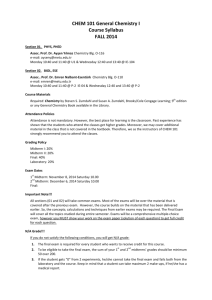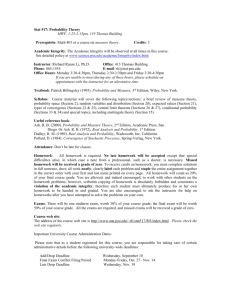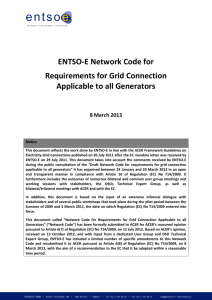All assignments, quizzes, and exams must be done on your own
advertisement
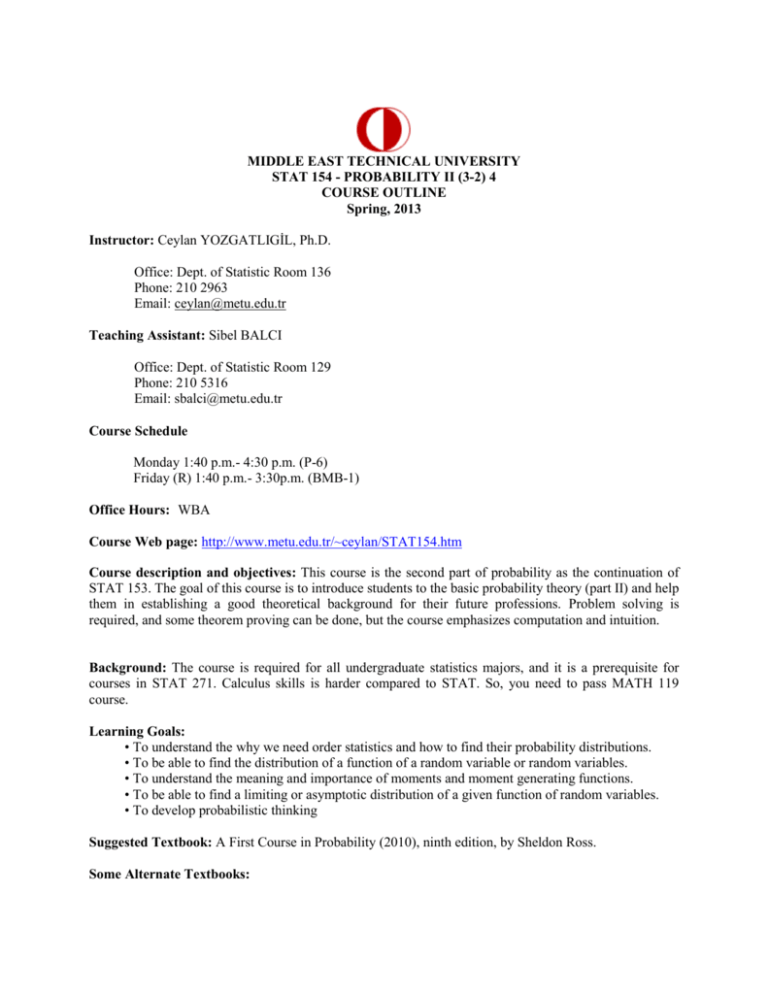
MIDDLE EAST TECHNICAL UNIVERSITY STAT 154 - PROBABILITY II (3-2) 4 COURSE OUTLINE Spring, 2013 Instructor: Ceylan YOZGATLIGİL, Ph.D. Office: Dept. of Statistic Room 136 Phone: 210 2963 Email: ceylan@metu.edu.tr Teaching Assistant: Sibel BALCI Office: Dept. of Statistic Room 129 Phone: 210 5316 Email: sbalci@metu.edu.tr Course Schedule Monday 1:40 p.m.- 4:30 p.m. (P-6) Friday (R) 1:40 p.m.- 3:30p.m. (BMB-1) Office Hours: WBA Course Web page: http://www.metu.edu.tr/~ceylan/STAT154.htm Course description and objectives: This course is the second part of probability as the continuation of STAT 153. The goal of this course is to introduce students to the basic probability theory (part II) and help them in establishing a good theoretical background for their future professions. Problem solving is required, and some theorem proving can be done, but the course emphasizes computation and intuition. Background: The course is required for all undergraduate statistics majors, and it is a prerequisite for courses in STAT 271. Calculus skills is harder compared to STAT. So, you need to pass MATH 119 course. Learning Goals: • To understand the why we need order statistics and how to find their probability distributions. • To be able to find the distribution of a function of a random variable or random variables. • To understand the meaning and importance of moments and moment generating functions. • To be able to find a limiting or asymptotic distribution of a given function of random variables. • To develop probabilistic thinking Suggested Textbook: A First Course in Probability (2010), ninth edition, by Sheldon Ross. Some Alternate Textbooks: A Course in Probability (2006), Neil A. Weiss. Understanding Probability (2012), Henk Tijm. Introduction to Probability and Mathematical Statistics (1992), Lee J. Bain and Max Engelhardt. Introduction to Probability Theory (1971) Hoel, P. G., Port, S. C. and Stone, C. J.. http://wiki.stat.ucla.edu/socr/index.php/EBook Many introductory probability books from the library will be helpful. Course Content: Emphasize problem solving and intuition. Some advanced concepts should be presented without proof, so as to devote more attention to the examples. 1st week: Introduction to order statistics 2nd week: Distributions of order statistics for discrete and continuous random variables 3rd week: Transformations of discrete random variables 4th week: Transformations of continuous random variables 5th week: Introduction to generating functions, moment generating functions, characteristic generating functions, factorial moment generating functions 6th week: Generating functions for discrete random variables 7th week: Generating functions for continuous random variables 8th week: Computing expectations by conditioning, computing variances by conditioning 9th week: Introduction to limit theorems, Chebychev’s inequality 10th week: Convergence in distribution, convergence in probability 11th week: Limiting moment generating functions 12th week: The central limit theorem 13th week: Normal approximations, applications to sampling 14th week: Some theorems on limiting distributions Attendance: Mandatory, though I will not take roll. You are responsible for everything we do in class, even on days you do not attend. Exams and Grading: There will be two in-class midterms and a final exam. This semester, you will not need calculators in the exams. Midterm exam 1 (25%) Midterm exam 2 (25%) Homework & Quiz (15%) Final (35%) Make-Up Work:Make-up exams will only be given in very unusual circumstances, with one week prior notification (or, in the event of an emergency, *very* strong documentation of that emergency). If you have this kind situation and don’t contact with me one week before or after the exam, you cannot take the make-up exam. Make-up exam will be given at the end of the semester and it will be similar to the final exam (cover all the topics). Course preparations & mechanics: Please try your best to read the assigned sections in the text before each lecture. The course moves at a brisk pace, so don't fall behind! Homework assignments form an integral component of the course. You should make every effort to solve the assigned problems, using the concepts learned from the lectures and readings. If you have any question, come see me during office hours, and/or talk to your teaching assistant. Help each other out! I genuinely want everyone to succeed in mastering the basics of probability by the end of the course! Homework: Assignments are due at the beginning of class on Fridays. You can be a group of two to solve the problems. Please clearly write down your name(s) on top of the first page. And if your assignment contains multiple pages, please staple them! Please write down your solutions legibly and neatly. Don't skimp on margins! Remember to properly define your variables, label your diagrams, etc., so that we know what you're trying to communicate. In general, you should show enough work/reasoning in deducing the final answer. If you need to refer to a specific result mentioned in class or in the textbook, please indicate so as well. Insufficient or uncited work will receive reduced or no credit. Collobration is allowed as idea-sharing. However, you should write up your work on your own and in your own words. Exact duplication of others' work is considered plagiarism. Your homework will not be graded, if you bring it after the recitation hour. Academic Integrity: All assignments, quizzes, and exams must be done on your own. Note that academic dishonesty includes not only cheating, fabrication, and plagiarism, but also includes helping other students commit acts of academic dishonesty by allowing them to obtain copies of your work. You are allowed to use the Web for reference purposes, but you may not copy code from any website or any other source. In short, all submitted work must be your own. Should a student be caught cheating during an examination or be involved in plagiarism, a zero (0) will be assigned for the exam, quiz or writing assignment. Please look at the following page for further information: http://www.ueam.metu.edu.tr/TURKCE/ueam/ueam_ilkeler/ueam_ilkeler_honor_code_tab.htm Important Dates: Week of the ADD-DROP for the classes: February 24-28, 2014 National Holiday (National Sovereignty and Children's Day, Wednesday) April 23, 214 Labor and Solidarity Day (Thursday) May 1, 2014 National Holiday (Commemoration of Atatürk & Youth and Sports Festival, Monday) May 19, 2014 Last date for the WITHDRAWAL: April 25, 2014 End of lectures: May 23, 2014 Final exams: May 26 – June 7, 2014 Announcement of final grades: June 16, 2014 Resit Examinations: June 18 – 20, 2014
